新概念英语2 第18课
新概念2册18课PPTPPT课件
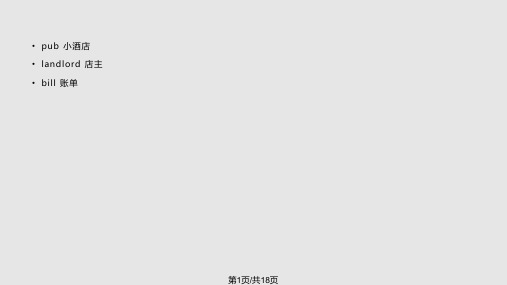
• 3) v. 离开 • leave some place 离开某个地方 • leave for some place 离开去某地 • eg. Leave England for a tour of the world. 离开英国去环球旅游。 • 4) on leave 休假中
第10页/共18页
第6页/共18页
Listening comprehension
第7页/共18页
Te x t • look for 寻找(过程) • eg. I am looking for my bag. • look for a job 找工作 • find 找到(结果,不能用进行时态) • eg. I found my brooch under the sofa. 我是在沙发下面找到胸针的。 • find out 发现,找出,搜出(结果) • eg. You should find out (the answer) for yourself. 你应该自己找出
第5页/共18页
• lord • as drunk as a lord 酩酊大醉 • eg. Lord! 天啊!哎呀!哎哟! • lord n. 贵族,勋爵 • duke [dju:k] 公爵 • marquis ['mɑ:kwɪs, mɑ:'ki:] 侯爵 • earl [ɜ:l] 伯爵 • viscount ['vaɪ,kaʊnt] 子爵 • baron ['bærən] 男爵 • sir 爵士 • lady • eg. Lady first. 女士优先。 • Ladies and gentlemen 先生们,女士们 (称呼套话) • Ladies 女厕所
第11页 随着(表示事态及状况的变化和进展) • eg. As she grew older, she became more pessimistic
新概念英语第二册课件Lesson18
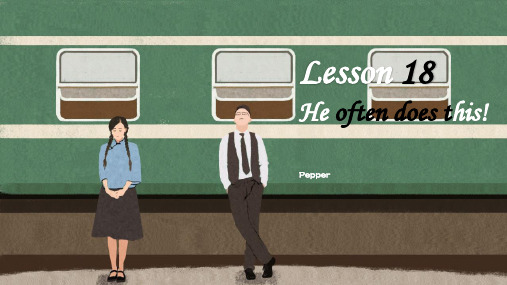
在同一范围内
Guilin is in the north of Guangxi.
to
不在同一范围内,也不接壤 Japan is to the east of China.
next to 紧靠…的旁边
The shop is next to the school.
beside 在…旁边
Come and sit beside (/by) me.
表示延续时间的介词
介词
用法
by
意为“在……之前;不迟于……”
for
意为“在……之前;不迟于……”
in
意为“在……以后;在……时间内”
since
意为“自从……以来;自……以后”
until
用于否定句中,意为“直到……才”,其前的谓语动词多为非延续性动词
用在肯定句中,意为“直到……为止”,其前谓语动词须用延续性动词
by
在…旁边,与 beside 可以互换 There is a chair by(beside) the table.
near 在…附近
There is a theatre near his home.
表示方位的介词
介词
用法
例句
around over
above
under
在…周围 在…(垂直)的正上方 抽象概念职位高低 在…(不一定垂直)的上方 职位高低 在…(垂直的)正下方
have用于“情态动词+have+过去分词”的结构,有推测、假设之意。 1.must+have+过去分词,表示对过去时间发生的动作或存在的情况 的推测,一般用于肯定句。
You must have left your bag in the theatre.
新概念英语2第18课ppt课件
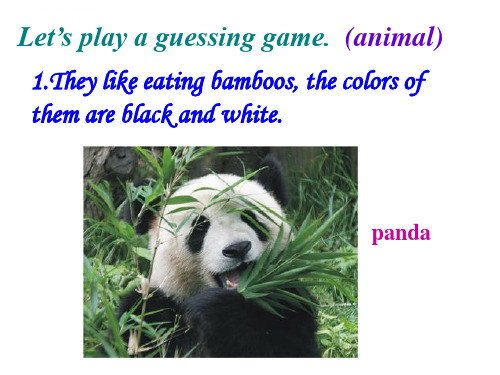
是以区(县)、乡(镇) 、村( 社区) 三级综 治中心 为指挥 平台、 以综治 信息化 为支撑 、以网 格化管 理为基 础、以 公共安 全视频 监控联 网应用 为重点 的“群 众性治 安防控 工程” 。
Today we’ll listen to a story about a woman who couldn’t find her handbag.
True or false?
1.The writer had lunch at a village pub. 2.She couldn’t find her bag after her meal . 3.She could pay the bill . 4.The landlord soon found it for her. 5.The dog had taken it into the park.
panda
“雪亮工程"是以区(县)、乡(镇) 、村( 社区) 三级综 治中心 为指挥 平台、 以综治 信息化 为支撑 、以网 格化管 理为基 础、以 公共安 全视频 监控联 网应用 为重点 的“群 众性治 安防控 工程” 。
2.They are the symbols of Australia, and they usually put their babies in the front pockets.
‘Did you have a good meal?’ he asked. ‘Yes, thank you,’ I answered, ‘but I can’t pay the bill. I haven’t got my bag.’ The landlord smiled and immediately went out. In a few minutes he returned with my bag and gave it back to me. ‘I'm very sorry,’ he said. ‘My dog had taken in into the garden. He often does this!’
新概念英语2 Lesson 18

Lesson 18 He often does this!【New words and expressions】pub n. 小酒店landlord n. 店主bill n. 帐单【Text】After I had had lunch at a village pub, I looked for my bag. I had left it on a chair beside the door and now it wasn't there! As I was looking for it, the landlord came in.'Did you have a good meal?" he asked.'Yes, thank you,' I answered, 'but I can't pay the bill. I haven't got my bag.'The landlord smiled and immediately went out. In a few minutes he returned with my bag and gave it back to me.'I'm very sorry,' he said. 'My dog had taken it into the garden. He often does this!'我在一家乡村小酒店吃过午饭后, 就找我的提包. 我曾把它放在门边的椅子上, 可这会儿不见了!当我正在寻找时, 酒店老板走了进来.“您吃得好吗?”他问.“很好, 谢谢. “我回答, “但我付不了帐, 我的提包没有了. “酒店老板笑了笑, 马上走了出去. 一会儿工夫他拿着我的提包回来了, 把它还给了我.“实在抱歉, “他说, “我的狗把它弄到花园里去了, 他常干这种事!”【课文讲解】1.After I had had lunch at a village pub, I looked for my bag.我在一家乡村小酒店吃过午饭后,就找我的提包。
新概念英语第二册第18课
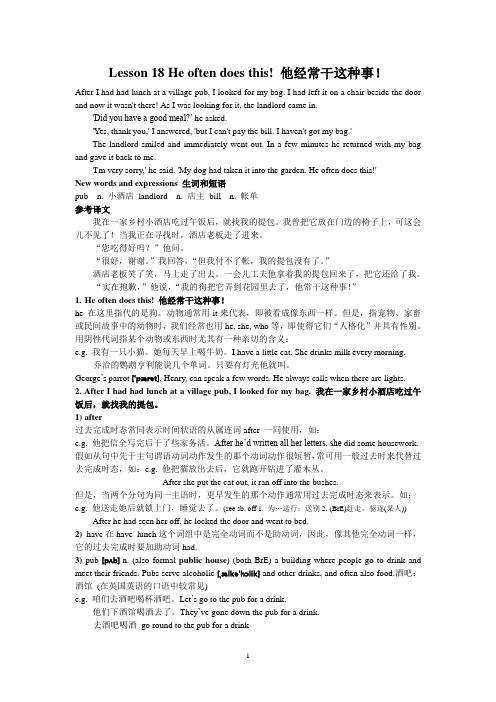
Lesson 18 He often does this! 他经常干这种事!After I had had lunch at a village pub, I looked for my bag. I had left it on a chair beside the door and now it wasn't there! As I was looking for it, the landlord came in.'Did you have a good meal?’ he asked.'Yes, thank you,' I answered, 'but I can't pay the bill. I haven't got my bag.'The landlord smiled and immediately went out. In a few minutes he returned with my bag and gave it back to me.'I'm very sorry,' he said. 'My dog had taken it into the garden. He often does this!'New words and expressions 生词和短语pub n. 小酒店landlord n. 店主bill n. 帐单参考译文我在一家乡村小酒店吃过午饭后,就找我的提包。
我曾把它放在门边的椅子上,可这会儿不见了!当我正在寻找时,酒店老板走了进来。
“您吃得好吗?”他问。
“很好,谢谢。
”我回答,“但我付不了帐,我的提包没有了。
”酒店老板笑了笑,马上走了出去。
一会儿工夫他拿着我的提包回来了,把它还给了我。
“实在抱歉,”他说,“我的狗把它弄到花园里去了,他常干这种事!”1.He often does this! 他经常干这种事!he 在这里指代的是狗。
新概念英语第二册第18课
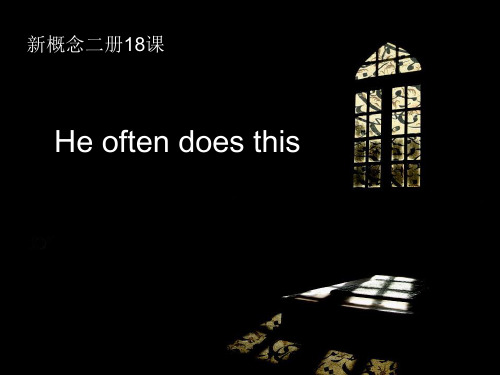
用带give的词组填空
Will the person who took my ruler please back give it ______ to me. 请那个拿了我尺子的人把尺子还给我。 When my children grew up ,I give all their away . toys _______ 当孩子长大成人,我就把他们的玩具给别的小孩玩。 We were losing the battle but we did not up give ________ . 我们已经输了战争,但是我们不会放弃。
(4) at a village pub
I like village pubs.
(5) look for(寻找)
我正在找我的铅笔。 I am looking for my pencil.
Wonderful sentences
2.I had left it on a chair beside the door and now it wasn’t there. 精彩点: (1)had left (2)leave something on …(把…遗忘在…)
Wonderful sentences
1.After I had had lunch at a village pub, I looked for my bag. 语言精彩点: (1)过去完成时的完美运用 (2)I had had lunch.
造句: 我那时已经吃过早餐/晚餐。 I had had breakfast/supper.
逐句精讲新概念英语第二册:第18课他经常干这种事!
Lesson18 He often does this 课⽂内容: After I had had lunch at a village inn, I looked for my bag. I had left it on a chair beside the door and now it wasn't there ! As I was looking for it, the inn-keeper came in. ‘Did you have a good meal ' he asked. ‘Yes, thank you,' I answered, ‘but I can't pay the bill. I haven't got my bag.' The inn-keeper smiled and immediately went out. In a few minutes he returned with my bag and gave it back to me. ‘I'm very sorry,' he said ' My dog had taken it into the garden. He often does this.' 本⽂语法:have的时态和变化 语法归纳:have作实义动词意为“拥有”,作助动词帮助构成完成时态。
1)作实义动词,意为“拥有”(=own, possess,have got): I have over a thousand books. = I own / possess over a thousand books 我有1000 多本书。
Did you have plenty of time to see your mother?你有⾜够的时间去看望你母亲吗? Have you got any views about this new plan?对于这个新计划你有何看法?(在英式⼝语中常⽤ have got代替have。
新概念英语第二册Lesson18
Lesson 18 He often does this! 他经常干这种事! First listen and then answer the question. What had happened to the writer's bag? After I had had lunch at a village pub, I looked for my bag. I had left it on a chair beside the door and now it wasn't there! As I was looking for it, the landlord came in. 'Did you have a good meal?" he asked. 'Yes, thank you,' I answered, 'but I can't pay the bill. I haven't got my bag.' The landlord smiled and immediately went out. In a few minutes he returned with my bag and gave it back to me. 'I'm very sorry,' he said. 'My dog had taken it into the garden. He often does this!'
新概念英语2第18课
新概念英语2第18课
Lesson18 He often does this!
After I had had lunch at a village pub, I looked for my bag. I had left it on a chair beside the door and now it wasn’t there! As I was looking for it, the landlord came in.
新概念英语2第18课
He often does this. he/she都可用来指pets. 此外,she 还可以指 nation, mountain, river, tower...
新概念英语2第18课
After I had had lunch at a village pub, I looked for my bag.
Lesson 18
He often does this!
新概念英语2第18课
Let’s play a guessing game. (animal) 1.They like eating bamboos, the colors of them are black and white.
panda
新概念英语2第18课
1.after引导时间状语从句,注意时态,had had过去完成时, looked for一般过去时。 Eg: 昨天我向经理汇报完之后又去仓库检查了一次. After I had reported to the manager yesterday, I went to the warehouse to check again.
have a good time have a cup of tea have a bath…
新概念英语第二册lesson18精品PPT课件
住客栈
2 landlord
(1)主人, 房东(旅馆,家庭,公寓)
(2)地主
lord n . 统治者,主人,贵族,勋爵
Lord! 天啊!哎呀!哎哟! as drunk as a lord 酩酊大醉
landlady 女主人;
3 Bill 1) n. 账单,纸币 (note)
2) n. 招贴,广告,海报
1) n. 账单,纸币 (note) pay the bill/settle the bill
付账
It’s wrong to leave a hotel without paying all your bills. 没有付账离开旅馆是不对的。
- 1、下载文档前请自行甄别文档内容的完整性,平台不提供额外的编辑、内容补充、找答案等附加服务。
- 2、"仅部分预览"的文档,不可在线预览部分如存在完整性等问题,可反馈申请退款(可完整预览的文档不适用该条件!)。
- 3、如文档侵犯您的权益,请联系客服反馈,我们会尽快为您处理(人工客服工作时间:9:00-18:30)。
New words and expressions:
pub [pʌb] n.小酒店,酒吧
landlord [‘lændlɔ:d] n.店主,房东,地主 bill [bil] n.账单
pub [pʌb] n. 小酒店,酒吧 Eg:我们去酒吧喝一杯吧! Let’s go to the pub for a drink! •inn 客栈,小旅馆 •motel 汽车旅馆
1.He returned with my bag and gave it back to me. 归还
2. Give in your exercise books to me.
上交 3.He can’t continue fighting. He will soon give in.
放弃,投降,让步(后不接宾语)
Group B: parrot, cat, mouse,
pig, hamster, cow
Among these animals , which of them can be kept as pets?
Debate
Do you like having pets?DebateYes
1. lovely and beautiful; 2. go out for a walk with them; 3. help people look after the house; 4. make family enjoyable; 5. help person feel less lonely;
As I was looking for it, the landlord came in. as= while当…的时候 Eg: 昨晚当我睡着的时候,一个小偷进来了。 As I was sleeping last night, a thief came in.
‘Did you have a good meal?’ he asked. ‘Yes, thank you,’ I answered, ‘but I can’t pay the bill. I haven’t got my bag.’
1. immediately 立刻,马上 同义词:at once, instantly, right away, straight away 2. in a few minutes 几分钟后 类似的说法: in a few days in a few weeks in a few months in a few years 3.give back归还 to表示方向
Today we’ll listen to a story about a woman who couldn’t find her handbag.
True or false?
1.The writer had lunch at a village pub.
2.She couldn’t find her bag after her meal .
Key structure
have的用法
1.have可作为助动词用于现在完成时have/ has+done和过去完成时had+done.
2.have 在某些词组中的用法相当于eat/ drink/ enjoy/ take 等。 Eg: have dinner have a good time have a cup of tea have a bath…
交出,让出,投降
Special difficulties(2) :
beside : 介词, 在…旁, 在…附近 Eg: We live beside the library. besides : 介词, 1. 除…之外(还包括 …) Eg: There are a lot of people at the party besides me. 2.而且, 此外 Eg: I’m quite busy today. Besides, I’ve got a bad cold.
在美式英语中,have和do/does/did一起构成否定和疑问。
Eg: He has a pen.—He doesn’t have a pen.—Does he have a pen?—Yes, he does.—No, he doesn’t.
Special difficulties(1): give
4.I gave away my collection of stamps to the little boy. 赠送
5.I have given up smoking.
放弃+(doing) sth 6.Three of our officers gave themselves up to the enemy.
1. have a meal 吃饭(此处用good修饰meal) 2. pay the bill付账 3. I haven’t got my bag. = I didn’t have my bag.
The landlord smiled and immediately went out. In a few minutes he returned with my bag and gave it back to me. ‘I'm very sorry,’ he said. ‘My dog had taken in into the garden. He often does this!’
kangaroo
Let’s have a match:
Describe the animals in English, let the members of the other group guess what they are. Group A: goldfish, dog, turtle,
snake, spider, sheep
No
1.dirty 2.waste time and money 3.carry some disease
Did you raise any pets? Do you like dogs as your pet?
When we talk about a dog, what words will you think of?
Lesson18
He often does this!
After I had had lunch at a village pub, I looked for my bag. I had left it on a chair beside the door and now it wasn’t there! As I was looking for it, the landlord came in. ‘Did you have a good meal?’ he asked. ‘Yes, thank you,’ I answered, ‘but I can’t pay the bill. I haven’t got my bag.’ The landlord smiled and immediately went out. In a few minutes he returned with my bag and gave it back to me. ‘I'm very sorry,’ he said. ‘My dog had taken in into the garden. He often does this!’
He often does this. he/she都可用来指pets. 此外,she 还可以指 nation, mountain, river, tower...
After I had had lunch at a village pub, I looked for my bag.
1.after引导时间状语从句,注意时态,had had过去完成时, looked for一般过去时。 Eg: 昨天我向经理汇报完之后又去仓库检查了一次. After I had reported to the manager yesterday, I went to the warehouse to check again. 2. look for 寻找(强调找的过程) find找到(强调寻找的结果) Eg: 我在寻找一个快速致富的方法。 I’m looking for a way to get rich quickly. Eg: 嘿,你在找茬吧。 Hey,you’re looking for trouble. Eg: 你能找到这个问题的答案吗? Can you find the answer to this question?
landlord [‘lændlɔ:d] n. 店主,地主, 房东 landlady n.女房东
Eg:我要当地主! I want to become a landlord !
bill [bil] 1.(大写)比尔(人名) 2.un.账单 pay the bill 付账 pay bill 工资单 Bill please !买单 Eg:比尔会替我买单的。 Bill will pay the bill for me. .海报,广告牌 show bill =poster 海报 kite bill 空头票据 Eg: 他答应带她去香港度周末的许诺不过是空头支票。 His promise to take her to Hong Kong for the weekend was just kite bill .
I had left it on a chair beside the door and now it wasn’t there! 1.leave a.离开,出发 leave sp离开某地 leave for sp出发去某地 Eg:他要离开重庆。 He will leave Chongqing. 他要出发去重庆。 He will leave for Chongqing. b.把(人、物)留下、丢下、遗留等。 Eg: Have you left anything in the car? 2. beside: prep.在…旁边 Eg:他的汽车正停在那辆卡车的旁边。 His car is parking beside the truck. besides : prep.除…之外 (还包括…)(区别见special difficulties)
